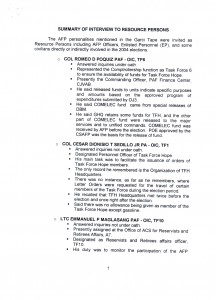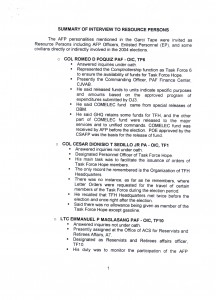By ELLEN TORDESILLAS and YVONNE T. CHUA
 THE military fact-finding board created to investigate allegations of the soldiers’ involvement in the 2004 election cheating did not pursue information given by two Marine officers of the money distributed by a general during and after elections that did not need liquidation.
THE military fact-finding board created to investigate allegations of the soldiers’ involvement in the 2004 election cheating did not pursue information given by two Marine officers of the money distributed by a general during and after elections that did not need liquidation.
The summary of the interviews of the 70 persons called by the board, which forms part of the declassified Mayuga Report, showed that Lt. Colonels Victoriano Pimentel and Elmer A. Estopin revealed they were given money by then Maj. Gen. Gabriel Habacon, head of antiterrorist Task Force Comet in Western Mindanao and vice commander of the Southern Command.
Pimentel was then commander of the Marine Battalion Landing Team-4 while Estopin headed the MBLT-10. Both were based in Sulu where then President Gloria Arroyo beat opponent Fernando Poe Jr., 78,429 to 60,807, in the congressional count for Sulu. But the tally of the National Citizens Movement for Free Elections, which had tabulated all of Sulu’s election returns, showed Poe leading Arroyo 45,740 to 23,896.
Referring to Pimentel’s testimony, the summary of interviews said, “During the election period, he admitted to have received money from TF Comet under MGen Habacon the amount between P90,000-100,000 and distributed the money to the Company Commanders and Platoon Leaders to support requirements such as meals, water and other basic needs. He admitted he did not submit or directed any expenditure report about the funds received from TF Comet.”
The summary added, “He admitted having received P70,000 cash after the election from MGen Habacon. He said that said cash was an additional support for the election. He recalled that the money was inside an envelope and distributed to Battalion Commanders by MGen Habacon at the 104th Brigade Headquarters. He did not submit any form of liquidation or consumption report about the money he received from (MGen) Habacon.”
The summarized interviews also revealed that Estopin “received fund support for election duties personally given by the Cmdr Task Force Comet, Gen Habacon, but it was given after the election. …The cash was around P75,000 which he claimed to have been distributed to his Company through his Logistics Officer but was not required to liquidate.”
The summary of Habacon’s interview did not show that he was asked by Mayuga and the other commissioners about Pimentel and Estopin’s revelations. He was also not asked the source of the money he distributed to the officers.
The funding for the military’s participation in the amount of P197 million was coursed through y Task Force HOPE (Honest, Orderly and Peaceful Elections), whose operations were handled by then Brig. Gen. Hermogenes Esperon Jr., deputy chief of staff for operations.
Esperon told the board, headed by former Vice Admiral Mateo Mayuga, that on the liquidation of funds, “it is automatic that when you received funds, you have to liquidate that.”
During a Senate hearing earlier this month, Sen. Jinggoy Estrada referred to reports that then First Gentleman Jose Miguel “Mike” Arroyo made several trips to Mindanao, including Western Mindanao, before, during and after the 2004 elections. He reportedly carried boxes or bags of cash believed to have been used to bribe military and poll officers in Mindanao to ensure his wife’s victory in the election, according to Estrada.
Habacon was referred to twice in the “Hello, Garci” tapes, both involving the canvassing in Sulu.
In her conversation with then elections commissioner Virgilio Garcillano on May 29, Arroyo expressed concern over the opposition’s claim that it had affidavits from teachers and the board of canvassers in Pangutaran town of how they were made to cheat.
Garcillano blamed Habacon: “Kasi sila Gen. Habacon ba, hindi masyadong marunong pa dyan, medyo sila ang umano nun (It’s General Habacon, they don’t know that much).”
Arroyo would again call Garcillano the late night of June 2 because she was worried about reports that the figures in the Election Returns, Statements of Votes and the Certificates of Canvass in Lanao del Sur and Basilan did not match.
Garcillano confirmed the mistake blaming Habacon and his men. “Sa Basilan, alam nyo naman ang mga military dun eh hindi masyadong marunong kasi silang gumawa eh. Katulad ho dun sa Sulu, si General Habacon…Ang akin patataguin ko na muna yung EO ng Pangutaran na para hindi siya maka-testigo ho (In Basilan, the military didn’t know how to do it, like what happened in Sulu with General Habacon. I’ll instruct the election officer in Pangutaran to go into hiding so he won’t have to testify).”
During the 2004 elections, then Col. Nelson Allaga, head of the 3rd Marine Brigade, was assigned to Sulu’s second congressional district, while his “mistah,” then Col. Nehemias Pajarito of the Army’s 104th Infantry Brigade, was in charge of Sulu’s first district. Both of them reported to Habacon.
When asked by the Mayuga board about the involvement of military officers in manipulation of election results, Habacon replied, “I cannot answer that.”
Mayuga Report: Summary of Interviews (Part 1)
Mayuga Report: Summary of Interviews (Part 2)
